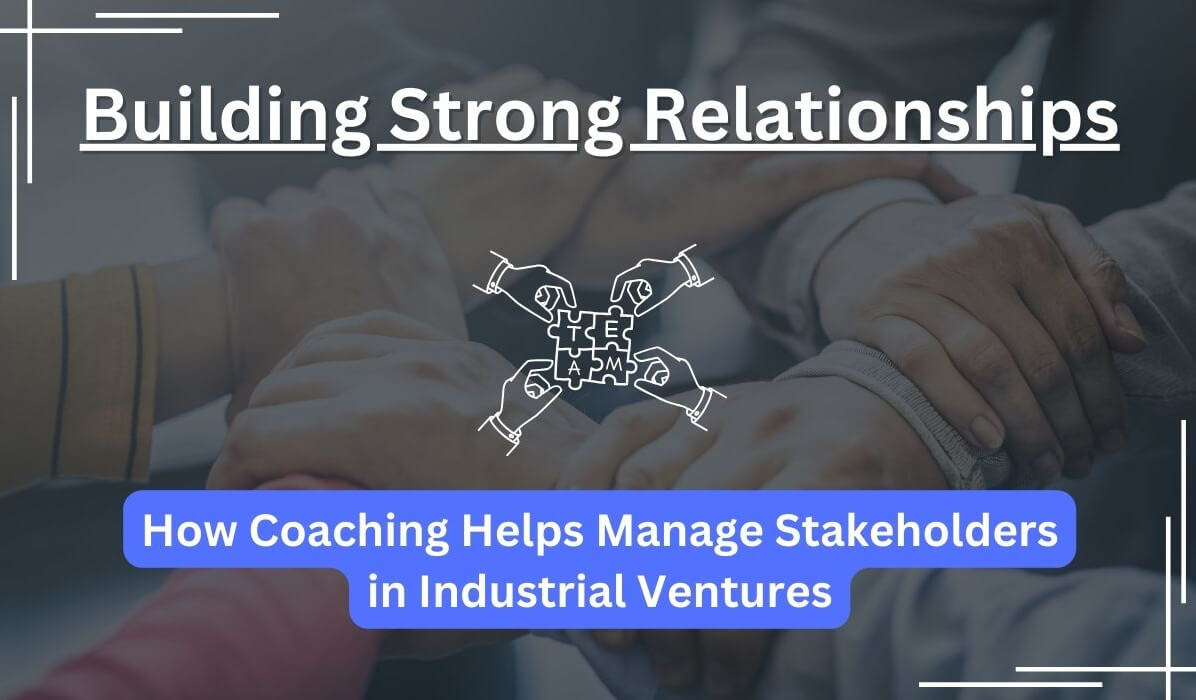Building Strong Relationships: How Coaching Helps Manage Stakeholders in Industrial Ventures
In the realm of industrial ventures, fostering robust relationships with stakeholders is fundamental for success. Through effective coaching, executives gain invaluable skills in navigating the complex landscape of stakeholder dynamics, enabling them to build trust, communicate strategically, and tailor strategies for optimal outcomes. The strategic use of coaching empowers leaders to manage stakeholders with confidence and empathy, setting the stage for prosperous collaborations and project achievements.

Importance of Stakeholder Relationships
-
Importance of Stakeholder Relationships: Establishing and nurturing strong stakeholder relationships is crucial for the success and sustainability of industrial ventures. Stakeholders play a vital role in project management, making collaboration and communication essential for achieving organizational goals.
-
Role of Coaching: Effective coaching can assist executives in building trust with stakeholders, fostering a supportive environment conducive to open dialogue and mutual understanding. Through coaching, executives can gain insights into stakeholders' perspectives and concerns, enabling them to tailor strategies that align with organizational objectives and values.
-
Foundation of Trust and Transparency: Successful stakeholder relationships are built on trust and transparency. Executives can demonstrate their commitment to stakeholders' interests through consistent communication and active listening, leading to shared success.
-
Cultivating Collaboration and Inclusivity: Prioritizing stakeholder relationships and utilizing coaching techniques to navigate challenges can cultivate a culture of collaboration and inclusivity within organizations. This fosters long-term prosperity and growth by aligning stakeholders with organizational goals.
Coaching Techniques for Stakeholder Management
In the realm of industrial ventures, effective coaching techniques play a vital role in cultivating strong stakeholder relationships for sustainable organizational success. Stakeholder management through coaching involves various strategies aimed at enhancing engagement and fostering positive relationships within a project or business setting.
Coaching for stakeholder management focuses on honing essential skills such as communication, teamwork, and relationship-building. Coaches work closely with individuals to develop their abilities in understanding stakeholder needs, aligning interests, and managing expectations. By enhancing these competencies, stakeholders can navigate complex business environments with confidence and clarity.
Effective coaching techniques also emphasize the importance of empathy and strategic thinking in stakeholder interactions. Coaches guide individuals in approaching relationships with a mindset of understanding and collaboration, which can lead to mutually beneficial outcomes for all parties involved. Furthermore, by instilling a sense of belonging within the team, coaching helps stakeholders feel valued and motivated to actively contribute to the project's success.
Effective Communication Strategies
Crafting clear and concise messages is essential in developing effective communication strategies for managing stakeholders in industrial ventures. Project managers must prioritize stakeholder engagement by incorporating various communication channels and techniques into their stakeholder management plan. By conducting thorough stakeholder analysis, project managers can tailor their communication strategies to suit the needs and preferences of different stakeholders, ultimately fostering strong stakeholder relationships and leading to positive outcomes for the project.
Effective communication involves more than just transmitting information; it requires active listening, empathy, and a collaborative approach. Project managers should strive to establish a partnership with stakeholders, where open dialogue and transparency are encouraged. This collaborative strategy not only ensures that stakeholders feel valued and heard but also allows for the alignment of goals and expectations, leading to a more efficient and successful project outcome.
Trust Building With Stakeholders
To cultivate strong relationships and foster successful outcomes in industrial ventures, developing trust with stakeholders is paramount. Trust building is a foundational element that underpins effective stakeholder management and collaboration in any industrial venture.
Here are three key strategies to help build trust with stakeholders:
- Transparent Communication: Honest and open communication is essential in building trust with stakeholders. By sharing information promptly and clearly, stakeholders feel valued and included in the decision-making process, leading to stronger relationships.
- Consistent Engagement: Regular and meaningful engagement with stakeholders demonstrates your commitment to the partnership. By actively involving stakeholders in discussions and seeking their input, you show respect for their opinions and expertise, fostering trust.
- Deliver on Promises: Following through on commitments and delivering results as promised is crucial for building trust. Consistency in meeting expectations helps establish credibility and reliability with stakeholders, strengthening the foundation of your relationships.
Conflict Resolution Through Coaching
Utilizing coaching techniques can effectively facilitate conflict resolution among stakeholders in industrial ventures. Conflict is a natural part of any relationship, and in the context of industrial ventures, where diverse stakeholders are involved, conflicts can arise due to differing priorities, expectations, or communication breakdowns. Coaching plays a crucial role in navigating these conflicts by fostering open communication, promoting collaboration, and building relationships based on trust.
Effective conflict resolution through coaching involves encouraging stakeholders to engage in constructive dialogue, actively listen to each other's perspectives, and work together towards finding mutually beneficial solutions. Coaches can help stakeholders develop negotiation skills, enhance their ability to manage emotions during conflicts, and foster a culture of teamwork and cooperation.
Leveraging Feedback for Improvement
In order to enhance stakeholder relationships and drive continuous growth in industrial ventures, leveraging feedback for improvement is imperative. Feedback serves as a valuable tool for progress, enabling managers and stakeholders to align their goals and expectations effectively.
Here are three key ways to leverage feedback for improvement:
- Enhanced Communication: Regular feedback sessions foster open communication channels between managers, stakeholders, and project teams. Through constructive feedback exchanges, all parties can voice their perspectives, address concerns, and work collaboratively towards shared objectives.
- Continuous Development: Feedback offers valuable insights that can guide the development of strategies and processes. By actively listening to feedback from stakeholders and partners, managers can identify areas for improvement, adapt their approaches, and drive innovation within the project management framework.
- Increased Engagement: Acknowledging and implementing feedback demonstrates a commitment to stakeholder input and encourages greater engagement. When stakeholders see their feedback being valued and acted upon, they are more likely to remain invested in the project and foster stronger relationships with the management team.
Coaching for Decision-Making Support
Guiding stakeholders through specialized coaching sessions can provide invaluable support for enhancing decision-making processes in industrial ventures. Effective coaching for decision-making support involves creating a collaborative environment where stakeholders feel empowered to contribute their insights and expertise. By fostering strong relationships and open communication channels, managerial coaching can help stakeholders align their goals with the overall objectives of the industrial venture.
In these coaching sessions, stakeholders are encouraged to share their perspectives and concerns, enabling managers to gain a comprehensive understanding of the challenges and opportunities at hand. Through this collaborative approach, decision-making becomes more informed and strategic, leading to better outcomes for the industrial venture as a whole. Additionally, coaching helps stakeholders develop the necessary skills and confidence to make sound decisions independently, further strengthening the organization's decision-making capabilities.
Influencing Stakeholder Engagement
Enhancing stakeholder engagement in industrial ventures involves fostering meaningful relationships and promoting active participation in decision-making processes. To influence stakeholder engagement effectively, consider the following strategies:
- Personalized Communication: Tailor your communication to the needs and preferences of each stakeholder. By understanding their communication style and preferred channels, you can ensure your messages resonate and encourage engagement.
- Transparent Collaboration: Foster an environment of transparency and openness in project management. By involving stakeholders in key discussions and decisions, you demonstrate respect for their input and expertise, enhancing their engagement in the venture.
- Consistent Relationship Building: Invest time in building relationships with stakeholders beyond project requirements. By showing genuine interest in their perspectives and needs, you create a foundation of trust that encourages ongoing engagement and collaboration.
Sustaining Strong Relationships in Industry
To maintain enduring relationships within the industrial sector, consistent engagement and proactive communication are essential pillars for fostering trust and collaboration.
In the realm of industrial ventures, sustaining strong relationships with stakeholders is paramount for long-term success. Building these relationships requires a strategic approach that involves continuous dialogue, active listening, and a deep understanding of stakeholder needs and expectations.
Effective coaching plays a crucial role in guiding industry professionals on how to manage these relationships with care and foresight.
Conclusion
In conclusion, the practice of coaching has proven to be a valuable tool in managing stakeholder relationships in industrial ventures.
By employing effective communication strategies, building trust, resolving conflicts, leveraging feedback, and supporting decision-making, stakeholders can be engaged and relationships sustained.
It is essential for industry professionals to recognize the importance of strong relationships with stakeholders and utilize coaching techniques to manage them successfully.
Frequently Asked Questions
Q1. How Can Cultural Differences Impact Stakeholder Relationships in Industrial Ventures?
Ans. Cultural differences can significantly impact stakeholder relationships in industrial ventures. Varied norms, values, and communication styles may lead to misunderstandings and conflicts. To navigate this, fostering cultural awareness, open dialogue, and mutual respect is essential.
Q2. What Are Some Common Challenges Faced When Coaching Stakeholders in a Multinational Project?
Ans. When coaching stakeholders in multinational projects, common challenges include language barriers, differing cultural norms, time zone disparities, and varying levels of understanding of project goals. Effective communication, cultural sensitivity, and flexibility are key to navigating these obstacles successfully.
Q3. How Can Technology Be Leveraged to Enhance Stakeholder Communication and Engagement?
Ans. Leveraging technology in stakeholder communication enhances engagement by providing real-time updates, interactive platforms, and personalized experiences. Utilizing tools like project management software, video conferencing, and social media can foster transparency, collaboration, and trust among stakeholders.
Q4. What Role Does Emotional Intelligence Play in Building Trust With Stakeholders?
Ans. Emotional intelligence plays a crucial role in building trust with stakeholders by fostering understanding, empathy, and effective communication. It enables leaders to navigate complex dynamics, manage conflicts, and cultivate meaningful relationships that are essential for successful industrial ventures.
Q5. How Can Coaching Help in Managing Power Dynamics and Hierarchies Within Stakeholder Relationships?
Ans. Coaching can navigate power dynamics within stakeholder relationships by fostering open dialogue, building self-awareness, and promoting collaboration. It empowers individuals to communicate effectively, understand diverse perspectives, and navigate hierarchies with empathy and strategic alignment.



